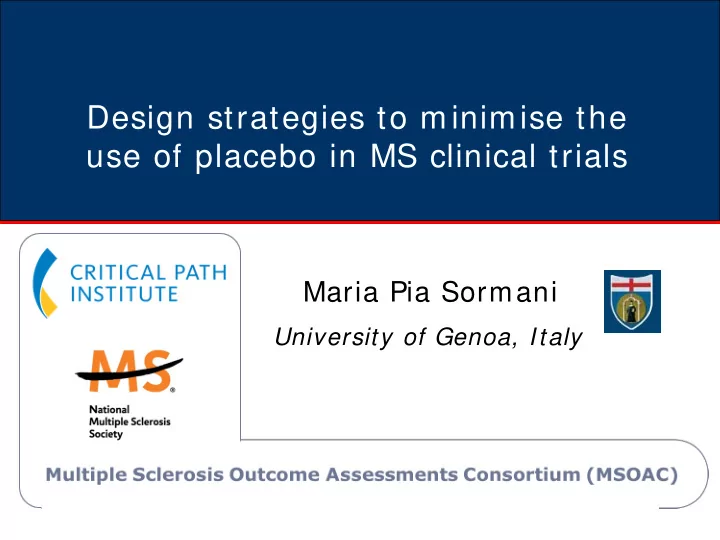

Design strategies to minimise the use of placebo in MS clinical trials Maria Pia Sormani University of Genoa, Italy
Study design strategies • Active controlled trials: both arms receive an active treatment • Surrogate endpoints: their use minimise the number of subjects and the time of exposure to placebo
Surrogate endpoints- MRI markers Line 354 EMA Guidelines: … So far, MRI measurements have not been proven to be a reasonably validated surrogate endpoint of the clinical outcomes and are, therefore, not acceptable as a primary endpoint in pivotal studies…
MRI markers as a surrogate for relapses 23 RCT in RRMS (1995-2009) Sormani et al, Ann Neurol 2009
MRI markers as a surrogate for relapses R 2 = 0 .7 6 31 RCT in RRMS (2009-2013) log(REL effect) = 0.001 + 0.53 log (MRI effect) REL effect ~ √ MRI effect Sormani et al, Lancet Neurol 2013
MRI markers as a surrogate for relapses phase II vs phase III trials results (7 couples of trials) Sormani and Bruzzi, Lancet Neurol 2013
MRI markers as a surrogate for relapses The paradigm MRI lesions-relapses seems to be valid trough a broad range of treatments. This observation supports the use of MRI lesions as a surrogate for relapses The relationship MRI lesions-disability is less predictable and was not assessed by this analysis
Example – Relapses-Disability Effect on disability progression (observed vs predicted from effect on relapses)* Pooled analysis of the ALLEGRO and BRAVO studies * according to Sormani et al Neurology 2010 Sormani et al, ECTRIMS 2013
Example – MRI markers-Relapses Effect on relapses (observed vs predicted from effect on MRI)* Pooled analysis of the ALLEGRO and BRAVO study The observed effect on relapses was the one predicted by the observed effect on MRI * according to Sormani et al Lancet Neurol 2013
Surrogate endpoints – MRI markers The paradigm MRI lesions-relapses seems to be valid trough a broad range of treatments. MRI lesions are a good surrogate for relapses in MS. The use of MRI endpoints in pivotal trials must be seen with more flexibility
More flexibility? 1. In the design of trials for testing the efficacy of drugs on relapses, at least for drugs with known mechanisms of action. - Example: Biosimilars, peg-IFN 2. For testing the efficacy of drugs already approved for adults in pediatric populations 3. For assay sensitivity in equivalence or non- inferiority trials 4. Adaptive trials
More flexibility? - Adaptive designs An adaptive design allows for changing or modifying the characteristics of a trial based on cumulative information obtained in the trial, as the trial is ongoing, without undermining the validity and integrity of the trial.
Surrogate endpoints + adaptive design If we have a newly validated surrogate endpoint (MRI in specific situations for MS) Randomization Interim analysis Efficacy based on Yes the surrogate Surrogacy? Efficacy based on the clinical No endpoint
MRI endpoints – study design • A phase III trial with MRI as the primary endpoint should not be based only on the statistical significance of the effect on MRI • Rather, the effect on MRI should be precise enough to guarantee a predicted effect on relapses which is clinically meaningful
Conclusions – more flexibility Line 354 EMA Guidelines: … So far, MRI measurements have not been proven to be a reasonably validated surrogate endpoint of the clinical outcomes and are, therefore, not acceptable as a primary endpoint in pivotal studies… So far, MRI measurements have been proven to be a reasonably validated surrogate endpoint of relapses, while have not be proven to be a surrogate of disability accumulation. Therefore, their use as a primary endpoint in pivotal studies can be considered only in very specific situations.
Conclusions – more flexibility The MSOAC is working to the definition of a new clinical outcome for the assessment of drug efficacy in MS. All the consortium members encourage regulatory agencies to leave the guidance open to the introduction of newer endpoints including an enhanced measure of disability in a few years.
Recommend
More recommend